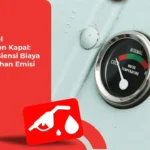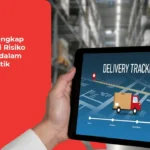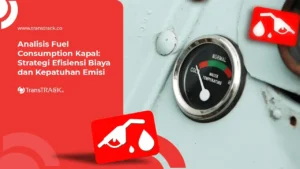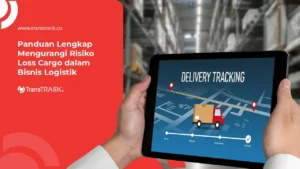Pentingnya Fleet Management System untuk Monitoring!
Diposting pada Juli 5, 2022 oleh Nur Wachda Mihmidati

Fleet Management System – Bagi perusahaan yang bergerak di bidang distribusi, tentunya memerlukan sebuah software atau aplikasi yang memiliki pengaruh cukup signifikan. Fleet Management Systems adalah solusi yang didesain untuk mengelola dan memonitoring kegiatan terkait armada logistik, seperti truk, mobil box, kontainer, dan kendaraan lainnya.
Kelayakan armada yang mengangkut logistik, penting untuk selalu diperhatikan mengenai ketepatan waktu pengiriman, dan juga kondisi pengemudi. Fleet Management System ini juga banyak digunakan sebagai alat pelacak dengan menggunakan manajemen sistem yang aman.
Digitalisasi manajemen armada menjadikan operasi dan administrasi lebih efisien, serta meminimalkan kerugian-kerugian. Ada banyak alasan lainnya yang harus dipertimbangkan untuk menyegerakan implementasi sistem/software yang mengotomatisasi berbagai aspek di perusahaan kamu. Pada artikel kali ini, Transtrack akan membahasnya:
- Keamanan Barang dan Kendaraan
Kehilangan barang kiriman dan kendaraan dapat membawa kerugian besar bagi perusahaan. Sejumlah fitur Fleet Management System dapat meningkatkan keamanan barang dan kendaraan. Pengelolaan tugas secara digital disertai dengan pemantauan kendaraan real-time mampu menggantikan, bahkan lebih efektif dari penugasan melalui panggilan telepon atau radio. - Manajemen Pengemudi Supaya Lebih Rapi
Bukan ratusan atau ribuan armada yang menjadi inti perusahaan kamu, namun staff pengemudi lah yang menjadi ujung tombak dari bisnis kamu bergerak. Tanpa staf driver yang baik, kendaraan kamu sudah pasti tidak akan beroperasi secara maksimal. Fleet Management Systems memberikan visibilitas penuh atas aktivitas kendaraan dan driver kamu. Selain lokasi real-time, kamu dapat memantau trip, waktu kendaraan dinyalakan dan dimatikan, lokasi-lokasi kendaraan berhenti, penyelesaian tugas driver, dan lain-lain. Dengan data-data ini, kamu bisa memberi arahan kepada driver kamu untuk memperbaiki kinerja mereka dan menghilangkan kebiasaan jelek saat berkendara. - Mudahnya Maintenance Kendaraan
Kecanggihan lainnya yang terdapat di dalam Fleet Management Systems adalah fitur pengingat waktu service kendaraan. Sistem ini akan mengingatkan alarm kapan waktunya untuk melakukan pergantian oli. Sehingga, umur pemakaian kendaraan jadi lebih lama.
Selain itu manajemen penggunaan bahan bakar yang kurang teratur tentunya akan menimbulkan efek negatif dan juga bisa mengancam kelancaran bisnis. Mungkin tak jarang, ada beberapa staf driver kamu yang melakukan kecurangan dengan cara meminta lebih banyak uang bensin karena lokasi pengiriman barang lebih jauh dari biasanya.
Namun dengan software manajemen kendaraan, konsumsi bahan bakar akan diawasi oleh sistem komputer. Dengan demikian, kamu bisa mengukur dengan tepat berapa biaya yang harus kamu keluarkan untuk ongkos jalan dan menghemat pengeluaran kamu.
- Otomatisasi Administrasi
Sebagai sistem yang baik, Fleet Management Systems juga berperan efektif, dengan menjadikan pekerjaan lebih efisien dan meminimalkan human error. Salah satu fungsi yang perlu diakomodasi adalah automasi laporan. Fleet Management System akan melakukan identifikasi, merinci, dan juga mengurangi pengeluaran yang tidak dibutuhkan, sehingga akan terbentuklah operasi bisnis yang lebih efisien.
Demikianlah pembahasan mengenai Fleet Management System yang perlu diketahui. Dengan mempertimbangkan beberapa hal diatas maka kamu akan tahu betapa pentingnya Fleet Management System untuk monitoring. Jika ingin memasang Fleet Management System untuk armada mu, maka kamu bisa langsung menghubungi Transtrack yang sudah terbukti memberikan banyak keuntungan.
Postingan Terbaru
Panduan Lengkap Mengurangi Risiko Loss Cargo dalam Bisnis Logistik
Februari 23, 2026Mengelola Cold Chain Secara Terintegrasi untuk Minim Risiko dan Kerugian
Februari 20, 2026Topik :
 English
English









